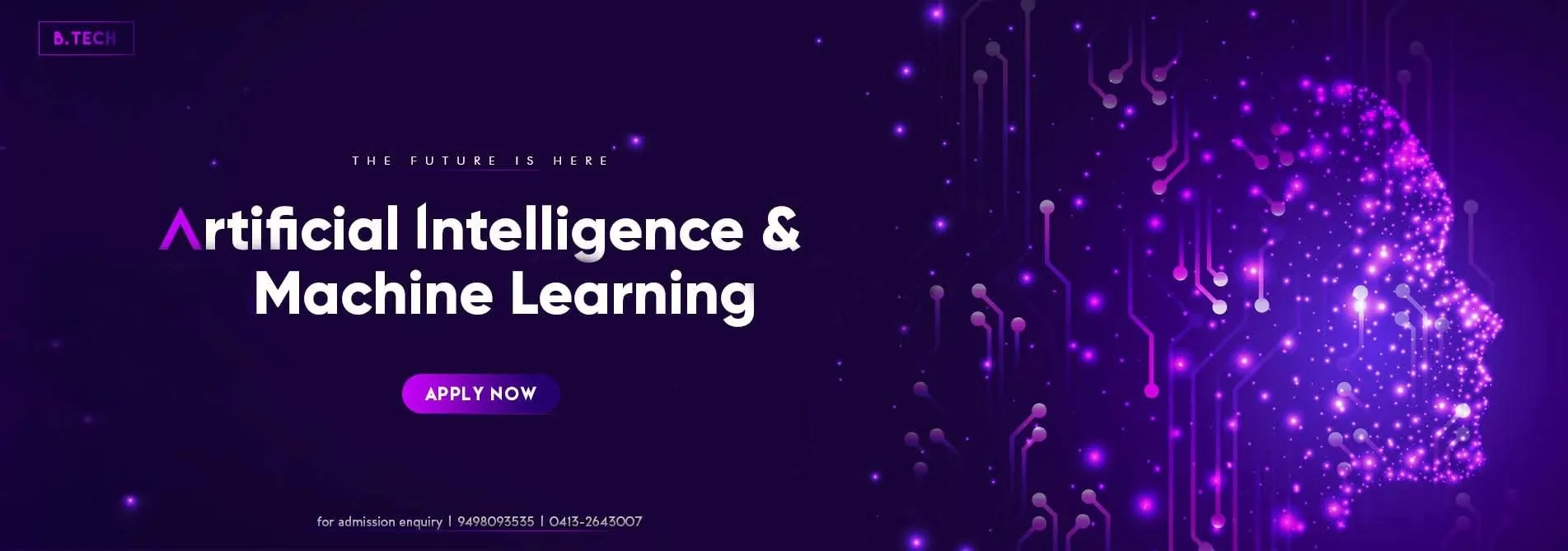
The Department of Artificial intelligence and Machine Learning
About the Department
The Al & ML department was established in 2021 with 60 students, and department intake has been increased to 120 in 2022 with steady progress and expanding to an intake of 180 in the year 2024. We strive to provide an enriching experience that equips our students with the skills to excel in the ever-evolving IT landscape.
The department emphasizes cutting-edge technologies in fields such as artificial intelligence, Machine Learning driving innovation and research to provide solutions for the challenges of the real world.

Our Al&ML department develops in-demand skills and cultivates a supportive learning environment where students gain the knowledge and experience to excel in the ever-evolving field of artificial intelligence
Our department initiatives will definitely mould the students to face the real world with prompt technical, interpersonal and problem-solving skills. To keep abreast with Industry requirements and standards, Several MoUs with Industries are established for Students Training, Seminars, Internships and Project works. Well-equipped class rooms, well networked Lab setups with latest software, Industry- Integrated projects, creative teaching-learning process, research based activities in the emerging areas, impressive placements, certification courses make the department well advanced on the professional front.
AIML program has consistently demonstrated strong placement outcomes. Graduates are highly sought after by top tech companies, securing roles in Al/Ml and related fields in TCS, Avasoft , Mitsogo, American Megatrends , Hexaware Technologies Limited , Botree Software International Limited.
Department Vision and Mission
Vision
To impart knowledge with the latest technological advancement in the field of (ARTIFICIAL INTELLIGENCE AND MACHINE LEARNING) and transform the learners into global contributors as Innovators, Entrepreneurs, and Researchers.
Mission
Department of Computer Science and Engineering-(ARTIFICIAL INTELLIGENCE AND MACHINE LEARNING) is committed.
Higher Order Thinking: To impart strong fundamental concepts, analytical and problem solving ability to hone their professional skills.
Continuous learning: To create an excellent conducive atmosphere for student learning and continuous updation of their knowledge on technology.
Entrepreneurship: To imbibe the spirit of leadership skills to be an active entrepreneur in society with moral values.
Competency: To enhance the creativity in research and to develop the competency of the students in the Technological field.
Programme Educational Objectives(PEO)
Graduates of -(ARTIFICIAL INTELLIGENCE AND MACHINE LEARNING) will
PEO1: Employability: Our Graduates shall be suitably employed in allied industries/services with professional competency and knowledge of modern tools.
PEO2: Higher Education: Our Graduates shall be capable to pursue higher studies/research in the field of engineering and management.
PEO3: Entrepreneurship: Our Graduates shall be prepared for a successful career by meeting ever increasing demands required by Computer Science and Engineering profession and enable them to become an entrepreneur.
PEO4: Ethical: Our Graduates cultivate professional and ethical attitudes with effective communication skills, team work and a multidisciplinary approach related to engineering issues.
Programme Outcomes (PO)
PO1: Engineering knowledge: Apply knowledge of mathematics and science, with fundamentals of Engineering and Technology to be able to solve complex engineering problems related to Computer Science and Engineering.
PO2: Problem analysis: Identify, Formulate, review research literature and analyze complex engineering problems related to CSE and reaching substantiated conclusions using first principles of mathematics, natural sciences and engineering sciences.
PO3: Design/development of solutions: Design solutions for complex engineering problems related to CSE and design system components or processes that meet the specified needs with appropriate consideration for the public health and safety and the cultural societal and environmental considerations.
PO4: Conduct investigations of complex problems: Use research–based knowledge and research methods including design of experiments, analysis and interpretation of data, and synthesis of the information to provide valid conclusions.
PO5: Modern tool usage: Create, Select and apply appropriate techniques, resources and modern engineering and IT tools including prediction and modeling to computer science related complex engineering activities with an understanding of the limitations.
PO6: The engineer and society: Apply Reasoning informed by the contextual knowledge to assess societal, health, safety, legal and cultural issues and the consequent responsibilities relevant to the professional engineering practice.
PO7: Environment and sustainability: Understand the impact of professional engineering solutions in societal and environmental contexts and demonstrate the knowledge of, and need for sustainable development.
PO8: Ethics: Apply Ethical Principles and commit to professional ethics and responsibilities and norms of the engineering practice.
PO9: Individual and team work: Function effectively as an individual and as a member or leader in diverse teams and in multidisciplinary Settings.
PO10: Communication: Communicate effectively on complex engineering activities with the engineering community and with society at large such as able to comprehend and with write effective reports and design documentation, make effective presentations and give and receive clear instructions.
PO11: Project management and finance: Demonstrate knowledge and understanding of the engineering management principles and apply these to one’s own work, as a member and leader in a team, to manage projects and in multi-disciplinary environments.
PO12: Life-long learning: Recognize the need for and have the preparation and ability to engage in independent and life-long learning in the broadest context of technological change.
Programme Specific Outcomes (PSO)
PSO1: Foundation of mathematical concepts: Ability to apply the fundamental principles of mathematics in the field of computer science and engineering to provide optimal solutions.
PSO2: Foundation of Software and Business Technology: To design, test, and evaluate software in order to meet the requirements of end users and provide cutting-edge technologies for devising cost-effective solutions.
Welcome Message

Mr.R.Raj Bharath
Department of Artificial Intelligence and Machine Learning
Artificial intelligence (Al) and Machine Learning are changing the world into smarter and intelligent. It empowers to innovate how to combine data, evaluate it, and apply the ensuing insights for better decision-making. The Smart world requires intelligent machines, software and applications with cutting-edge technologies. Artificial Intelligence uses machine learning, deep learning and other advance techniques to solve real world problems in combination with big data analytics, statistical computation and data visualization.
With the challenges in the current digital world Al & ML enables to Build and scale systems with trust and transparency to drive digital transformation, deliver personalized products and make more data-backed decisions.
It creeps into every sector which includes personal assistants, IT industries, healthcare industries, Banking systems, administration.
Programs
Department of Artificial intelligence and Machine Learning
The Department of Artificial Intelligence and Machine Learning at Manakula Vinayagar Institute of Technology offers B.Tech in Artificial Intelligence and Machine Learning focusing on latest innovation and upcoming technologies in the Domain of Artificial Intelligence.
Achievements
We are proud to showcase the significant achievements of our department. Both students and faculty have consistently excelled in academics, research, and industry collaboration, receiving multiple awards, and recognitions. Key accomplishments include successful partnerships with industry leaders, impactful research publications, and high placement rates in prominent companies within the sector
Faculty
Our Department faculty are highly dedicated and collaborative, working together effectively to ensure successful outcomes. They are passionate about providing high-quality education with a strong emphasis on practical, industry-relevant learning. The faculty possess extensive expertise in research areas such as Data Science, Systems Engineering & Operations Research, Information and Communication Engineering, Data Mining and Natural Language Processing.
MoU
Events
Magazine
Placements
We are pleased to present our students who have gained positions with top recruiting firms, demonstrating their talent and the high level of education and training they get in our department. Our extensive industry connections and comprehensive placement help ensure our alums have successful careers with top companies.
Batch Wise Placement Statistics (click below to view pdf )
2021-2025,
If you have any inquiries regarding the department, please feel free to reach out to us. We are here to assist you with any questions or information you may need.
Mr.R.Raj Bharath, Head,
Department of Artificial intelligence and Machine Learning
